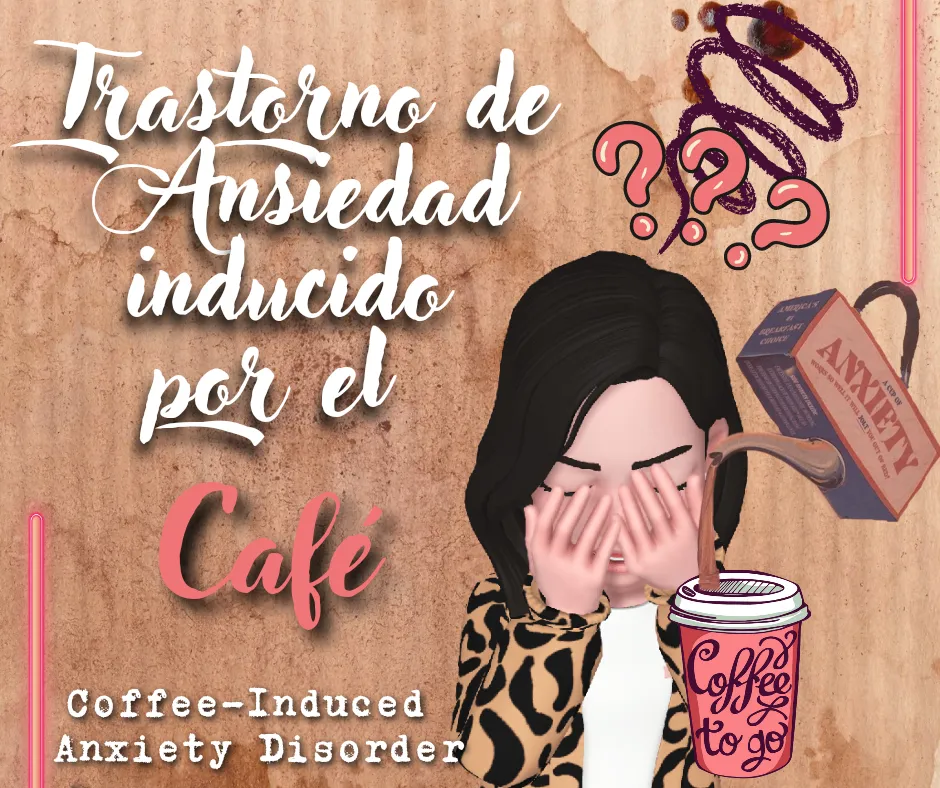

¡Saludos amigosss! Continuando con mis post educativos sobre los Trastornos de Ansiedad, el día de hoy les traigo un tema que moralmente no debería tocar 😑 ¡¡porque yo amo el café con locura en todas sus presentaciones!! 😍💕☕️ así que, realmente a muy pocas personas les digo que abandonen el hábito 😅, a menos que de verdad lo ameriten como en los casos de los que les voy a hablar a continuación 👇🏼.
Les comentaba en el post pasado que existen cuadros reales de Trastornos de Ansiedad asociados al consumo de sustancias, algunas ilegales, algunas legales como los medicamentos y tenemos otras legales de consumo tan habitual, que ya no las consideramos ni peligrosas, pero la verdad es que ¡sí pueden llegar a serlo!
Una de estas sustancias es la tan amada por muchos Cafeína, de verdad me gustaría con toda el alma decirles que el consumo de Café no representa ningún riesgo para la salud de las personas, incluso hay estudios que demuestran los beneficios de su uso a nivel general en la salud, pero como todo en esta vida, el consumo en exceso de él ¡sí es malo!
Y se vuelve aún más malo cuando tenemos un sustrato importante para sufrir alguna enfermedad, en este caso de índole emocional, y es que el consumo de Café se puede convertir en un círculo vicioso que puede hacer que grandes cantidades de cafeína se acumulen en tu organismo y generen efectos no tan buenos.
Greetings friends! Continuing with my educational posts about Anxiety Disorders, today I bring you a topic that I did not want to touch because morally I should not because ¡I love coffee madly in all its forms! 😍💕☕️ so I tell very few people to give up the habit 😅 unless they really deserve it like the cases I am going to talk about 👇🏼.
I told you in the last post that there are real cases of Anxiety Disorders associated to the consumption of substances, some illegal, some legal such as drugs and we have other legal substances so commonly consumed that we no longer consider them dangerous, but the truth is that they can be!
One of these substances is the so loved by many Caffeine, I would really like to tell you with all my heart that the consumption of coffee does not represent any risk to the health of people, there are even studies that show the benefits of its use at a general level in health, but like everything in this life, excessive consumption of it is bad!
And it becomes even more bad when we have an important substrate to suffer any disease, in this case of an emotional nature, and the consumption of coffee can become a vicious circle that can cause large amounts of caffeine to accumulate in your body and generate not so good effects.

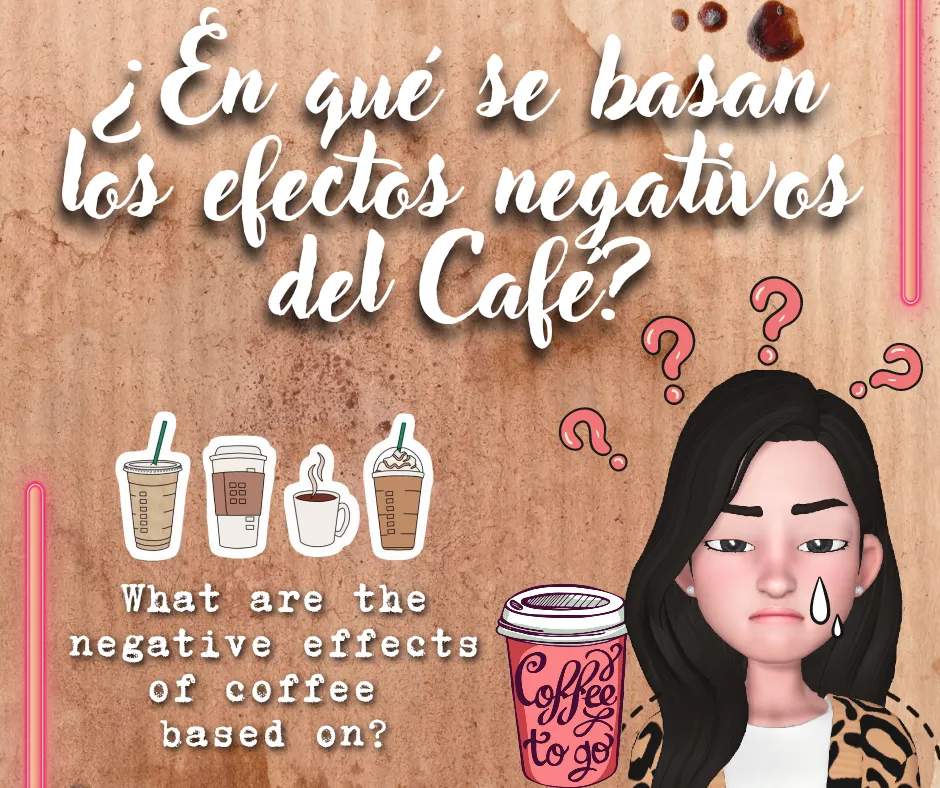

Todo comienza porque la absorción de la cafeína es realmente muy rápida por el organismo, a los 45 minutos ya ella se empieza a metabolizar, esto quiere decir que el efecto producto de su consumo es casi inmediato, alcanza un pico máximo entre la 1era y 2da hora y se elimina de tu organismo entre 4 a 6 horas posterior al consumo.
El hecho de que su pico máximo sea en la primera y segunda hora, pero se elimine en su totalidad 4 a 6 horas después ¡es bastante malo! porque puede que a las 3 horas posterior al consumo de tu taza de café ya sientas la necesidad de consumir más para sentirte más activo, enérgico, con mayor capacidad de concentración o alerta, que son los efectos principales del café.
Sin embargo, como la caída de los niveles de cafeína en sangre se hacen después de esa primera o segunda hora y de forma muy súbita, pero aún no se ha eliminado todo el resto del café de nuestro organismo sino 2 o 4 horas después, si tomamos una nueva taza ocasionará que tengamos más miligramos de cafeína en nuestro organismo sin darnos cuenta, porque sumamos la cantidad que ya teníamos residual y la que ahora estamos consumiendo.
It all starts because the absorption of caffeine is really very fast by the body, after 45 minutes it begins to metabolize, this means that the effect of its consumption is almost immediate, it reaches a maximum peak between the 1st and 2nd hour and is eliminated from your body between 4 to 6 hours after consumption.
The fact that its maximum peak is in the first and second hour, but is eliminated in its totality 2 to 4 hours later, is quite bad, because it is possible that 3 hours after the consumption of your cup of coffee you already feel the need to consume more in order to feel more active, energetic, with a greater capacity of concentration or alertness, which are the main effects of coffee.
However, since the fall of the caffeine levels in the blood takes place between the first and second hour and is very sudden, but not all the rest of the coffee has been eliminated from our organism until 2 hours later, it will cause us to have more milligrams of caffeine in our organism without realizing it, and thus progressively.

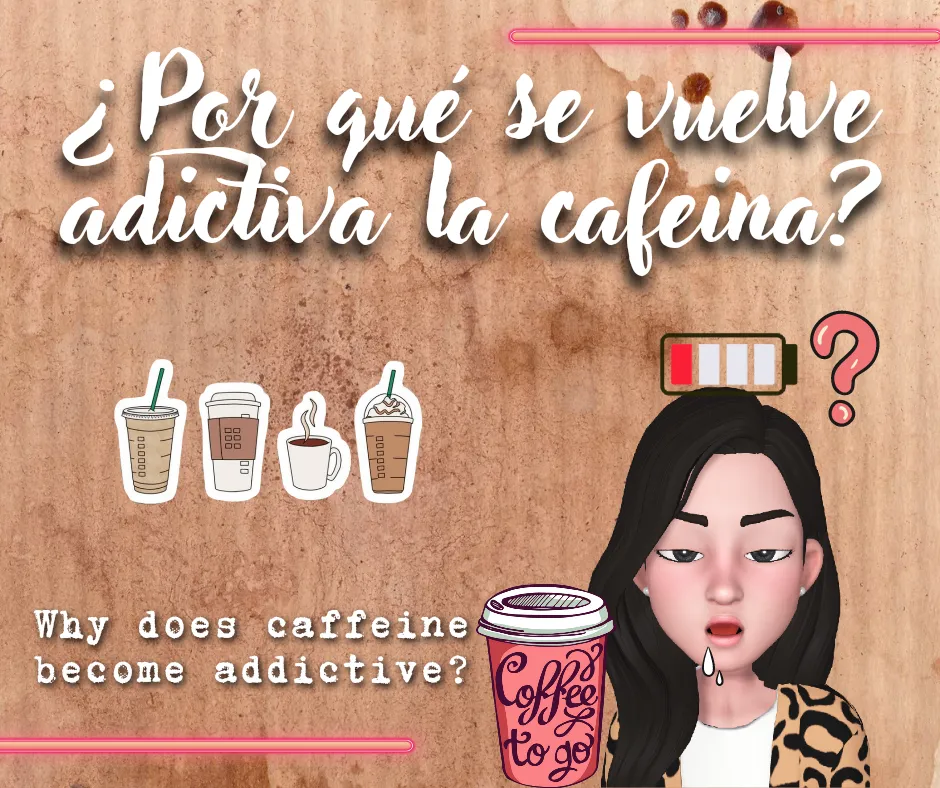

La cafeína puede volverse realmente adictiva sobre todo en personas que necesitan estar alerta constantemente, en trabajos que ameritan estar con todos sus sentidos al 100% funcionando por largos periodos de tiempo, en estudiantes que se preparan para exámenes, o en personas que necesitan disminuir su necesidad de dormir.
Y es justamente porque el efecto pasa relativamente rápido, pero a la vez que pasa rápido, el punto máximo de absorción también se alcanza a la misma velocidad, lo que hace que en este punto puedan generarse esos efectos que buscamos, pero que pueden llegar a ser de forma exagerada, y por ende no muy beneficiosos.
Caffeine can become really addictive especially in people who need to be constantly alert, in jobs that require them to be with all their senses at 100% functioning for long periods of time, in students preparing for exams, or in people who need to reduce their need for sleep.
And it is precisely because the effect happens relatively fast, but at the same time that it happens fast, the maximum point of absorption is also reached very fast, which makes that in this maximum point can generate those effects that we are looking for, but in an exaggerated way so they are not very beneficial.

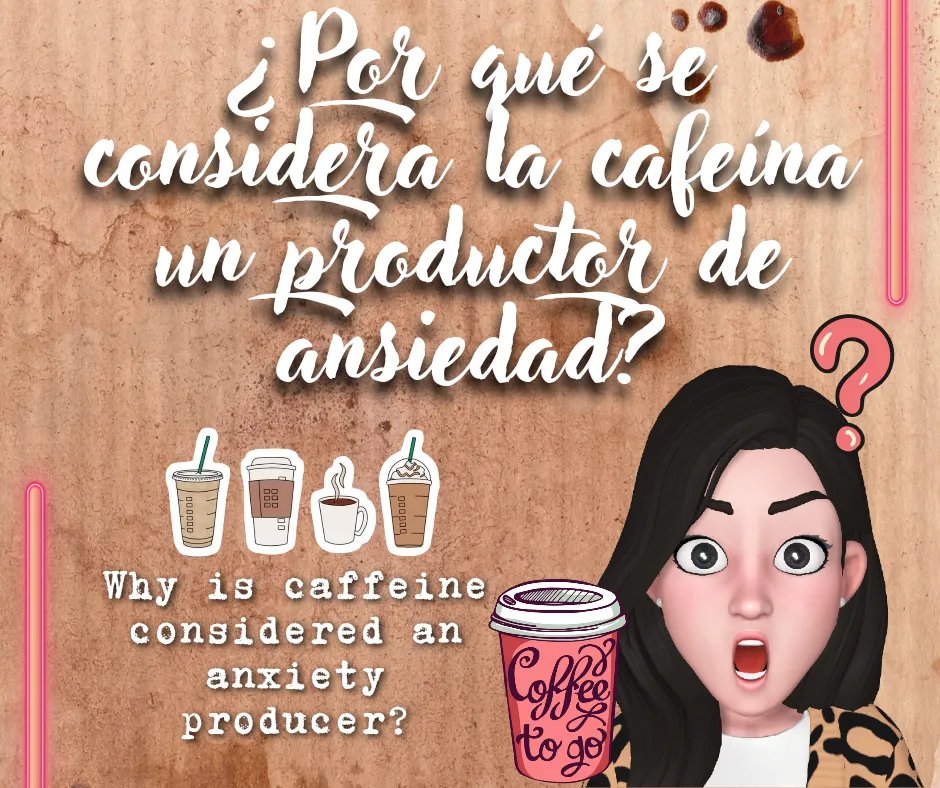

Justamente por lo que les expliqué arriba, en ese punto máximo de absorción de la cafeína es cuando se pueden presentar los síntomas parecidos a los de una Crisis de Ansiedad en las personas que nunca han tenido uno, pueden desencadenarse también en los que ya sufren de esta enfermedad, e incluso pueden llegar a episodios más severos de ansiedad como Crisis de Pánico.
Pero ¡tranquilos! este efecto no es algo tan frecuente, si fuera así no sería tan común consumir café; a manera de referencia deben saber que el consumo máximo de café para una persona común debería ser máximo 4 a 5 tazas al día (cada taza de 240ml u 8 onzas).
Pero también deben saber que la sensibilidad a la cafeína es muy variable, por eso algunos solo con una sola taza ya pueden presentar los síntomas de ansiedad, pero la mayoría de los síntomas moderados a severos los presentaran después de la 4ta a 5ta taza de café en gran parte de la población.
Precisely because of what I explained above, in that maximum point of caffeine absorption is when the symptoms similar to those of an Anxiety Crisis can appear in people who have never had one, they can also be triggered in those who already suffer from this disease, and can even reach Panic Crisis.
But be calm! this effect is not something so frequent, otherwise it would not be so common to consume coffee, as a reference you should know that the maximum consumption of coffee for a common person should be maximum 4 to 5 cups a day (Each cup of 240ml or 8 ounces).
But you should also know that the sensitivity to caffeine is very variable, that is why some people can present symptoms of anxiety with only one cup, but the majority of the moderate to severe symptoms are presented after the 4th to 5th cup of coffee in a great part of the population.

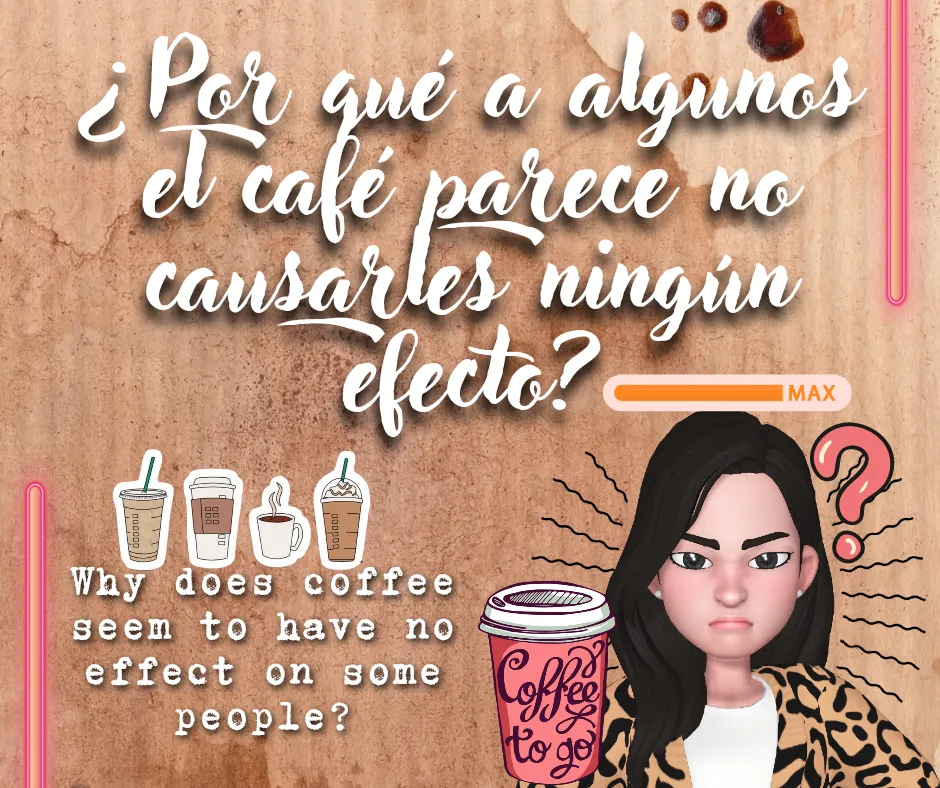

Las personas que han tenido alto consumo de Café durante largos periodos de tiempo tienen mayor tolerancia a grandes cantidades de cafeina y esto es por el mecanismo que usa el café para generar sus efectos.
La cafeína es un psicoestimulante, su mecanismo se basa en que ella al absorberse en sangre y llegar a nuestro cerebro ocupa el lugar de una molécula súper importante para nosotros llamada Adenosina.
La Adenosina es un neuromodulador, así llamamos a este tipo de moléculas, ella se encarga de que sustancias que nos estimulan no se liberen en demasía en nuestro cerebro y por ende nos mantengamos exaltados todo el tiempo o tengamos miedo o ganas de huir constantemente, es decir "ella modula", se va liberando progresivamente en el día y se va acumulando, ocasionando que al final del día nos sintamos cansados y tengamos la necesidad de dormir.
Pero cuando llega la cafeína y ocupa el lugar de la Adenosina, entonces la adenosina no puede hacer su trabajo y deja que los estimulantes se liberen en demasía ¿cuáles estimulantes? Los neurotransmisores como la dopamina, glutamato y la noradrenalina.
Ahora bien, en estas personas que consumen café durante largos periodos de tiempo, la adenosina al notar que la cafeína no la deja hacer su efecto, ella al ser muy inteligente aumenta su producción para contrarrestar el efecto del café, es entonces cuando vemos esas personas que consumen y consumen café, pero el efecto de sentirse alertas o de disminuir la capacidad de dormir ya no es logrado y es porque tienen mucha adenosina.
People who have had a high consumption of coffee for long periods of time have a greater tolerance to large quantities of coffee and this is due to the mechanism that coffee uses to generate its effects.
Caffeine is a psychostimulant, its mechanism is based on the fact that when it is absorbed in the blood and reaches our brain it takes the place of a super important substance for us called Adenosin.
Adenosine is a neuromodulator, this is how we call this type of protein, it is in charge that substances that stimulate us are not released too much in our brain and therefore we stay excited all the time, having constant fear or wanting to run away all the time, "it modulates", it is released progressively during the day and accumulates, causing that at the end of the day we feel tired and have the need to sleep.
But when caffeine arrives and takes the place of adenosine, then adenosine cannot do its job and allows stimulants to be released in excess, what stimulants? Neurotransmitters such as dopamine, glutamate and noradrenaline.
Now, in these people who consume coffee for long periods of time, the adenosine noticing that the caffeine does not let it do its effect, it is very intelligent so it increases its production to counteract the effect of the coffee so then we see those people who consume and consume coffee, but the effect of feeling alert or to diminish the capacity to sleep is no longer achieved.

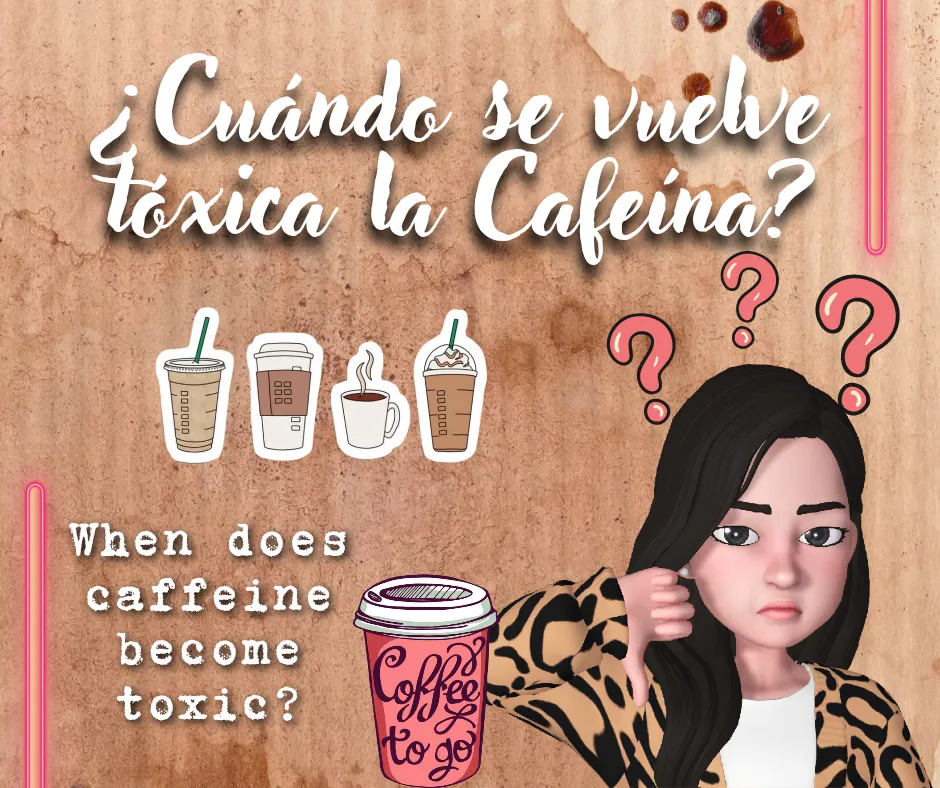

En el momento de consumir el café lo vemos como algo muy beneficioso, podemos sentimos más estimulados, incluso más sociables, alegres, concentrados, alertas, pero si está cafeína se acumula sin darnos cuenta y llega a niveles por encima de los 400 mg puede volverse realmente tóxica sobre todo en personas que ya tienen un sustrato.
Sustrato que puede ser biológico o por algún proceso emocional, la cafeína puede llegar a ser tan tóxica que incluso por encima de los 1000 mg puede llegar a ocasionar convulsiones, y es que esos neurotransmisores estimulantes que se liberan en demasía y que eran regulados por la Adenosina, pueden realmente aumentar la actividad neuronal hasta ese nivel de ocasionar una estimulación descontrolada de las neuronas, porque, repito ¡nada en exceso es bueno!
At the moment of consuming coffee we see it as something very beneficial, we can feel more stimulated, even more sociable, cheerful, concentrated, alert, but if this caffeine accumulates without realizing it and reaches levels above 400 mg it can become really toxic especially in people who already have a substrate.
Substrate that can be biological or due to some emotional process, caffeine can become so toxic that even above 1000 mg it can cause convulsions, and the fact is that those stimulating neurotransmitters that are released in excess and that were regulated by Adenosine, can really increase neuronal activity up to that level of causing an uncontrolled stimulation of neurons, because I repeat! nothing in excess is good.

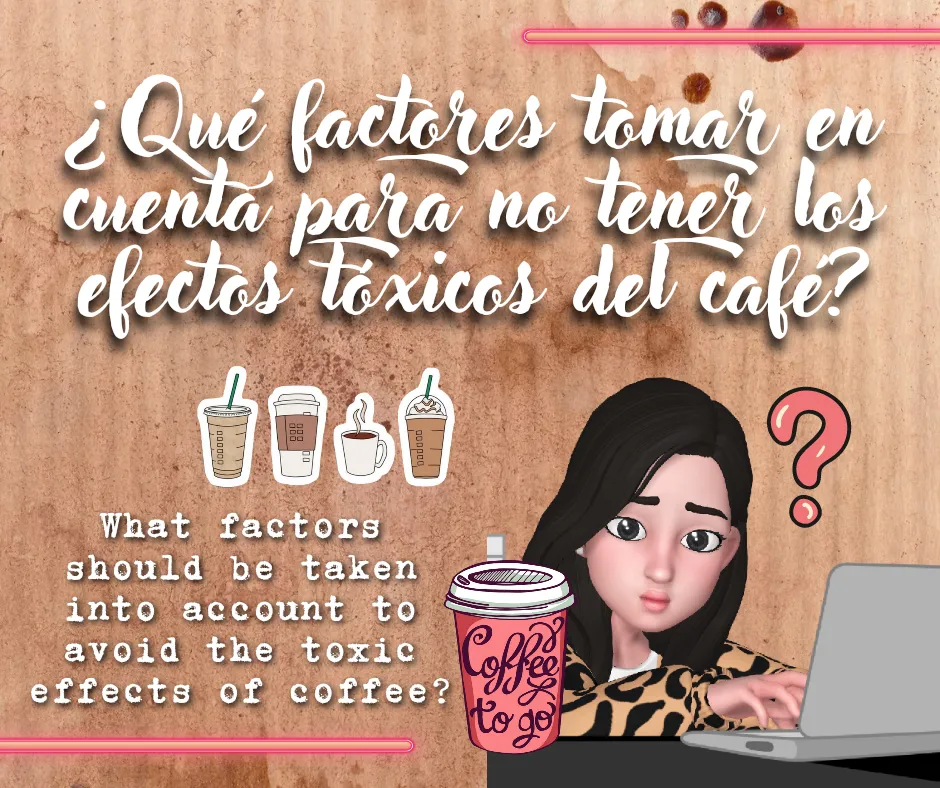

-Lo primero que debemos saber es que si tienes tendencia a la ansiedad lo mejor es evitar el café, ese es el deber ser, pero seamos realistas casi todos tomamos café tengamos sustrato para la ansiedad o no, así que mi sugerencia es no tomar más de 2 tazas de café al día.
Si por el contrario estás sufriendo de Crisis de Pánico no hay opciones ¡no lo consumas! existen estudios de pacientes con Trastornos de Pánico a los que el café incluso en poca cantidad indujo la crisis, no necesariamente por el grado de toxicidad, porque los miligramos eran pocos, pero la sola predisposición de saber que es un psicoestimulante puede desencadenar la crisis, realmente son muchos factores los que influyen, pero en definitiva ¡es mejor no consumir café si sufres de ellas!
-Una taza de café puede tener entre 80 a 100 mg de cafeína, así que si lo máximo que debemos consumir es 400 mg usen ese parámetro como referencia. Es preferible solo consumir la mitad, porque, ¡repito! La sensibilidad es distinta para cada persona, es solo un parámetro de referencia que tenemos basado en muchísimos estudios científicos, pero hay mucha variabilidad interpersonal.
-Consume siempre alimentos antes de tomar café o durante su consumo, esto hará que la absorción se retrase un poco en el estómago y por ende los efectos no serán tan intensos ni tan rápidos.
-Bebe suficiente agua durante el día, hará que los niveles de cafeína en sangre se diluyan, sean menor y se eliminen más rápido a nivel renal, y es que la cafeína tiene un efecto diurético, por ende, puedes llegar a deshidratarte y sin querer concentrar aún más la cantidad de cafeína en tu cuerpo.
-Recuerda que la cafeína es un psicoestimulante, pero existen otros también comunes en el mercado que son de uso habitual como el té, el cacao, las bebidas energéticas, el mate, etc, y todos ellos estimulan al mismo tiempo, por lo que si estás consumiendo café intenta no consumir otros psicoestimulantes que pueden actuar de forma sumatoria.
-Recuerda que las bebidas carbonatadas muchas tienen cafeína tómalo en cuenta a la hora de consumir café, una lata de Coca Cola, por ejemplo, puede tener alrededor de 40-50 mg de cafeína, una lata de Red Bulk tiene 80 mg de cafeína, una lata de Monster tiene 160 mg de cafeína, recuerda también que este tipo de bebidas tienen otros agregados que aumentan el efecto de la cafeína (próximamente haré un post al respecto sobre ellas y sobre los psicoestimulantes que hablé arriba)
-Toma en cuenta que algunos medicamentos incluyen la cafeína entre sus componentes, como por ejemplo los antimigrañosos, por lo que también hay que adicionar esos miligramos de cafeína a los del café que consumimos a diario, lee siempre los componentes de los medicamentos y los miligramos de cafeína que contienen.
-No se recomienda el café en niños ni en embarazadas, las razones son obvias, por todo lo que les estoy explicando, además siempre se excluye a estos grupos de los estudios científicos porque son de alto riesgo, por lo que no sabemos realmente los migramos que podrían soportar esos organismos y ¡tampoco queremos saberlo! Por otro lado, se ha asociado el alto consumo de café al nacimiento de niños con bajo peso y por ende alta probabilidad de enfermedades neonatales.
-Deben saber amigos que el café descafeinado también contiene cafeína, solo que la cantidad es algo insignificante con respecto al café de uso común, habitualmente alrededor de 10-30 mg de cafeína, pero es importante que también lo sepan.
-Los tés como el mate tienen exactamente la misma cantidad de cafeína que el café, básicamente la yerba mate es el mismo café, una taza de té negro tiene aproximadamente 50 mg de cafeína mientras que el té verde tiene unos 30 mg (también les traeré posteriormente un post más completo al respecto de esto)
-The first thing to know is that if you have a tendency to anxiety the best thing to do is to avoid coffee, that's what it should be, but let's be realistic, almost all of us drink coffee whether we have a substrate for anxiety or not, so my suggestion is not to drink more than 2 cups of coffee a day.
If on the contrary you are suffering from Panic Crisis do not consume it! There are studies of patients with Panic Disorders in which coffee even in small quantities induced the crisis, not necessarily because of the degree of toxicity, because the milligrams were few, but the only predisposition to know that it is a psychostimulant can trigger the crisis, there are really many factors that influence, but ultimately it is better not to consume coffee if you suffer from them!
-A cup of coffee can have between 80 to 100 mg of caffeine, so if the maximum we should consume is 400 mg, use this parameter as a reference. It is preferable to consume only half, because, I repeat! Sensitivity is different for each person, it is only a reference parameter that we have based on many scientific studies.
-Always consume food before drinking coffee or during its consumption, this will delay the absorption a little in the stomach and therefore the effects will not be as intense or as fast.
-Consume enough water during the day, this will dilute the levels of caffeine in the blood, it will be less and it will be eliminated faster at a renal level, since caffeine has a diuretic effect, therefore, you can become dehydrated and without wanting to increase even more the amount of caffeine in your body.
-Remember that caffeine is a psychostimulant, but there are others also common in the market that are commonly used such as tea, cocoa, energy drinks, mate, etc, and all of them stimulate at the same time, so if you are consuming coffee try not to consume other psychostimulants that can act in addition.
-Remember that many carbonated drinks have caffeine, take it into account when consuming coffee, a can of coke, for example, can have around 40-50mg of caffeine, a can of Red Bulk has 80 mg of caffeine, a can of Monster has 160 mg of caffeine, also remember that these types of drinks have other additives that increase the effect of caffeine, soon I will make a post about them and about the psychostimulants that I talked about above.
Take into account that some medications include caffeine among their components, such as anti-migraine medications, so we must also add those milligrams of caffeine to the coffee that we consume daily, always read the components of the medications and the milligrams of caffeine that they contain.
-Coffee is not recommended for children or pregnant women, the reasons are obvious for all that I am explaining, besides these groups are always excluded from scientific studies because they are high risk, so we do not really know the migrations that could support these organisms and we do not want to know it either! On the other hand, the high consumption of coffee has been associated to the birth of children with low birth weight.
-You should know friends that decaffeinated coffee also contains caffeine, only that the amount is somewhat insignificant with respect to the coffee of common use, usually around 10-30 mg of caffeine, but it is important that you also know this.
-Teas like mate have exactly the same amount of caffeine as coffee, basically yerba mate is the same coffee, a cup of black tea has about 50mg of caffeine while green tea has about 30mg, I will also bring you later a more complete post about this.

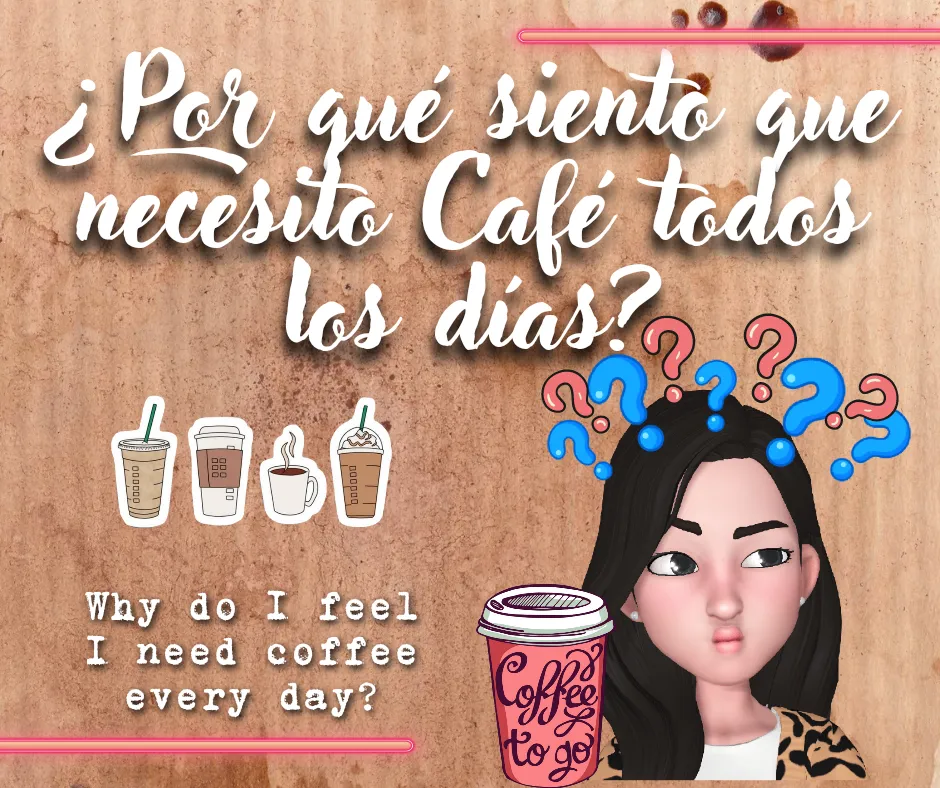

Habitualmente esto ocurre en las personas que tienen consumo crónico de café, se sienten cansados, con dolor de cabeza, con dificultad para concentrarte, coordinar o en general se sienten sin energía ¿la razón? ¡son síntomas de abstinencia a la cafeína!
Las personas que consumen por largo periodo de tiempo cafeína, al no permitir que la adenosina cumpla su efecto, ella se ve obligada a aumentar su producción para poder cumplir su efecto, ya se los dije arriba, así que los días que no consumas café sentirás la necesidad porque los niveles de adenosina son muy altos y recuerda que ella es la que se encarga de prepararte para descansar y dormir.
Básicamente tu organismo necesitará ese café para contrarrestar el efecto ahora excesivo de la adenosina y poder mantenerte alerta durante todo el día y no con tanta pesadez y somnolencia.
Usually this occurs in people who have chronic consumption of coffee, they feel tired, with headache, with difficulty to concentrate, to coordinate or in general they feel without energy, the reason? these are symptoms of caffeine withdrawal.
People who consume caffeine for a long period of time, by not allowing adenosine to fulfill its effect, it is forced to increase its production to be able to fulfill its effect, as I said above, so the days that you do not consume coffee you will feel the need because the levels of adenosine are very high and remember that it is the one that is in charge of preparing you to rest and sleep.
Basically your body will need that coffee to counteract the now excessive effect of adenosine and be able to stay alert throughout the day.

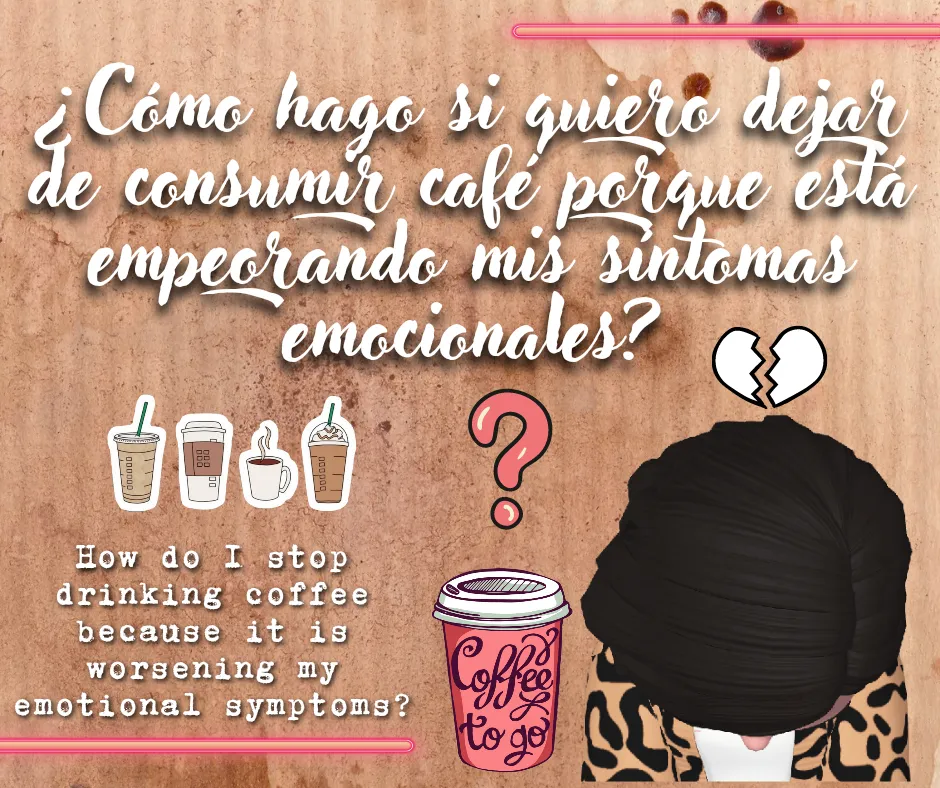

Lo bueno del café es que como su mecanismo es rápido, el periodo de abstinencia también durará poco y no es severo como otras drogas, podrías llegar a sentir dolor de cabeza, náuseas, dolor abdominal, somnolencia, irritabilidad, hostilidad, etc, pero si lo vas dejando de forma progresiva los síntomas pueden llegar a ser mínimos o incluso no existir.
Lo ideal es ir disminuyendo las cantidades de café que consumes poco a poco con el transcurrir de los días y luego dejarlo progresivamente ¿en cuánto tiempo? Depende de tú tolerancia y la intensidad de los síntomas que presentes.
The good thing about coffee is that as its mechanism is fast, the withdrawal period will not last long and it is not severe like other drugs, you could feel headache, nausea, abdominal pain, drowsiness, irritability, hostility, but if you stop it progressively, that is to say without doing it overnight, the symptoms can become minimal or even non-existent.
The ideal is to decrease the amount of coffee you consume little by little with the passing of the days and then to stop progressively, for how long? It depends on your tolerance and the intensity of the symptoms you present.

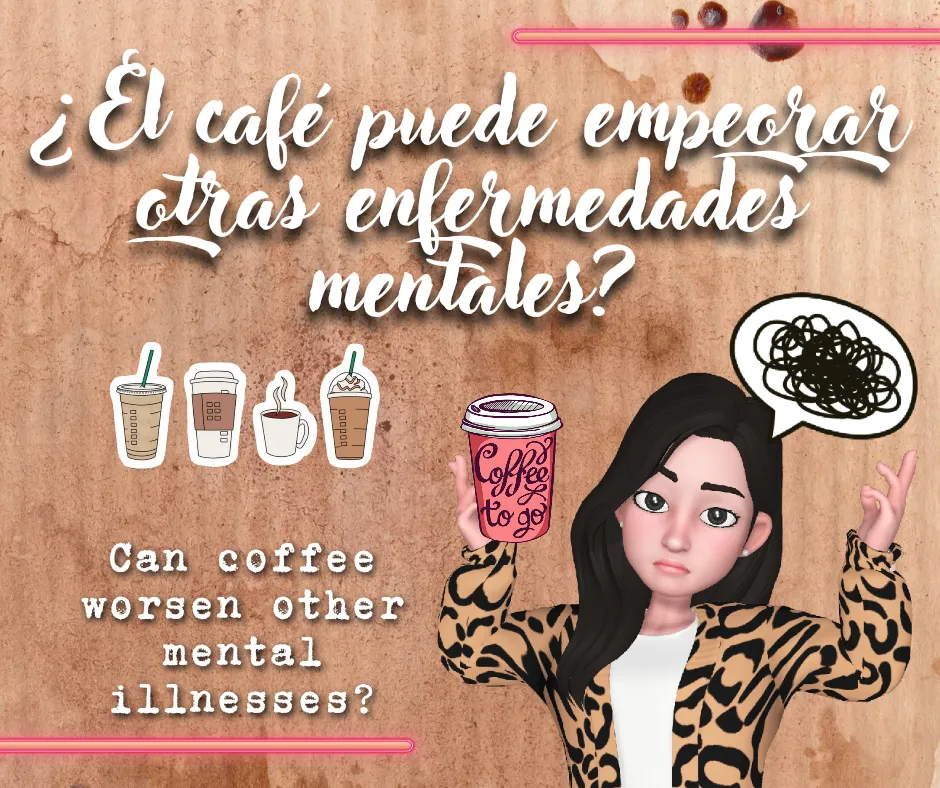

Sí, incluso se ha asociado a episodios de psicosis, por supuesto a altas concentraciones, además ya les dije arriba que pueden ocasionar hasta convulsiones en pacientes con antecedentes o sin antecedentes de estas cuando las concentraciones superan los 1000 mg de cafeína.
Al tener un efecto tan inmediato puedes sentirte exaltado, más sociable y feliz, pero al ocurrir el descenso relativamente rápido, también tu humor puede decaer con él a la misma velocidad y volverte irritable, hostil o triste, y este cambio brusco en las emociones puede hacer que se descompense alguna de tus enfermedades mentales de base, si las tuvieras.
Recuerden que lo más importante a la hora de tratar este tipo de enfermedades es estabilizar el humor, por lo que los cambios bruscos no nos interesan para nada, si van a haber episodios de alegría o tristeza, no queremos que cambien bruscamente de un extremo a otro.
Yes, it has even been associated with episodes of psychosis, of course at high concentrations, I even told you that they can even cause convulsions.
By having such an immediate effect you may feel exalted, more sociable and happy, but as the drop occurs relatively quickly, your mood may also decline with it and become irritable, hostile, etc., and this sudden change in emotions can cause your basic mental illnesses to decompensate.
Remember that the most important thing when treating this type of illness is to stabilize the mood, so the abrupt changes do not interest us at all, if there are going to be episodes of joy and happiness, we do not want them to change abruptly from one extreme to another.

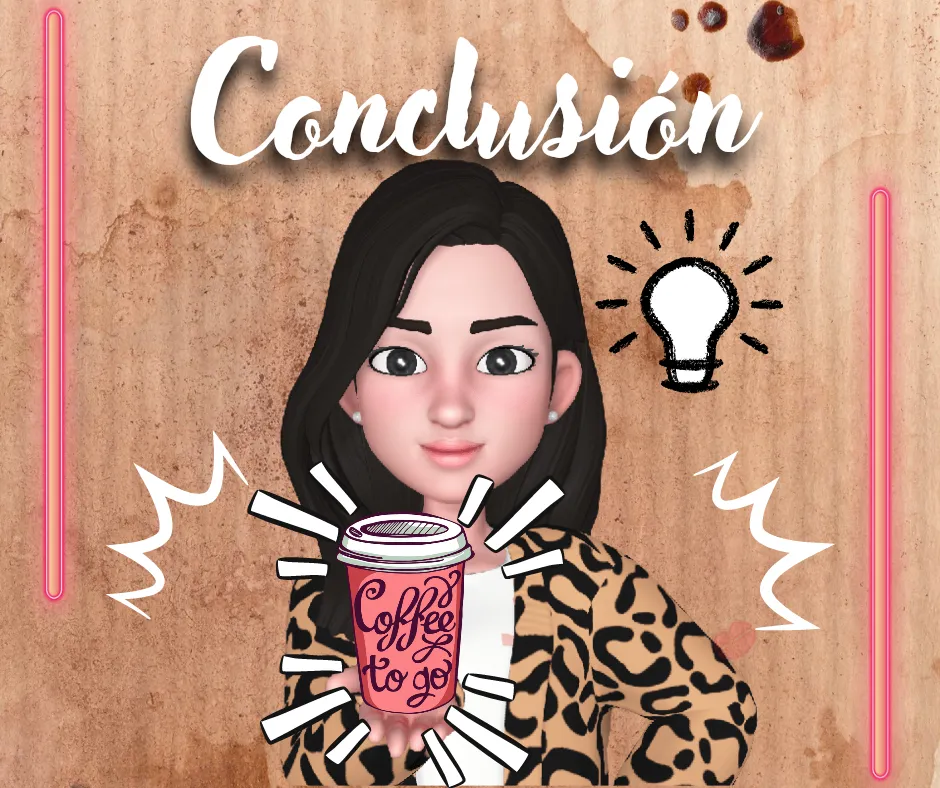

En conclusión ¡amigos el café consumido con moderación no es malo! solo que, como todo en la vida ¡debe ser equilibrado! a dosis muy altas pueden causar crisis severas psiquiátricas como Crisis de Ansiedad, de Pánico o ser el responsable de descompensación de otras enfermedades mentales como Trastornos Depresivos o Trastornos Psicóticos, por eso incluimos a esta sustancia dentro del grupo a descartar cuando tenemos una persona con un Trastorno de Ansiedad.
Pero realmente si lo consumimos como una sustancia social, con un número de tazas al día que sea menor a 3, debe ser suficiente para no tener efectos adversos significativos, siempre probando la sensibilidad y notando nosotros mismos hasta que nivel somos tolerantes a él, del resto podemos seguir consumiendo nuestro café, yo lo seguiré tomando como siempre 🤭💕☕️, pero sí era necesario informarles que realmente es una sustancia que debe ser controlada 👩🏻⚕️✍️.
Ahora sí me despido mis queridos Hivers 🤗, espero que les haya sido de utilidad el post y si tienen alguna pregunta al respecto, por favor déjenmela en los comentarios 👇🏼👇🏼.
In conclusion, friends, coffee consumed in moderation is not bad, only that, like everything in life, it must be balanced, at very high doses it can cause severe psychiatric crises such as Anxiety, panic attacks or be responsible for decompensation of other mental illnesses such as Depressive Disorders or Psychotic Disorders, that is why we include this substance within the group to be discarded when we have a person with an Anxiety Disorder.
But really if we consume it as a social substance, with a number of cups a day that is less than 3, should be enough to not have significant adverse effects, always testing the sensitivity and noting ourselves to what level we are tolerant to it, otherwise we can continue consuming our coffee, I will continue drinking it as usual 🤭💕☕️, but if I thought it was important to inform you all this about it.
Now I say goodbye my dear Hivers 🤗🤗, I hope this post has been useful and if you have any questions about it, please leave them in the comments 👇🏼👇🏼.

Thank you for stopping by and reading!

Imagen editing and separators
[ESP] Todas las imágenes fueron creadas en Canvas App y Picsart App por @liveofdalla usando recursos gratuitos de ambas Apps.
[ENG] All images were created in Canvas App and Picsart App by @liveofdalla using free resources from both Apps.
[ENG] How much caffeine is too much
Food and drugs Administration - FDA
Mis redes sociales | My social Networks
|Twitter|Facebookr|Instagram|
